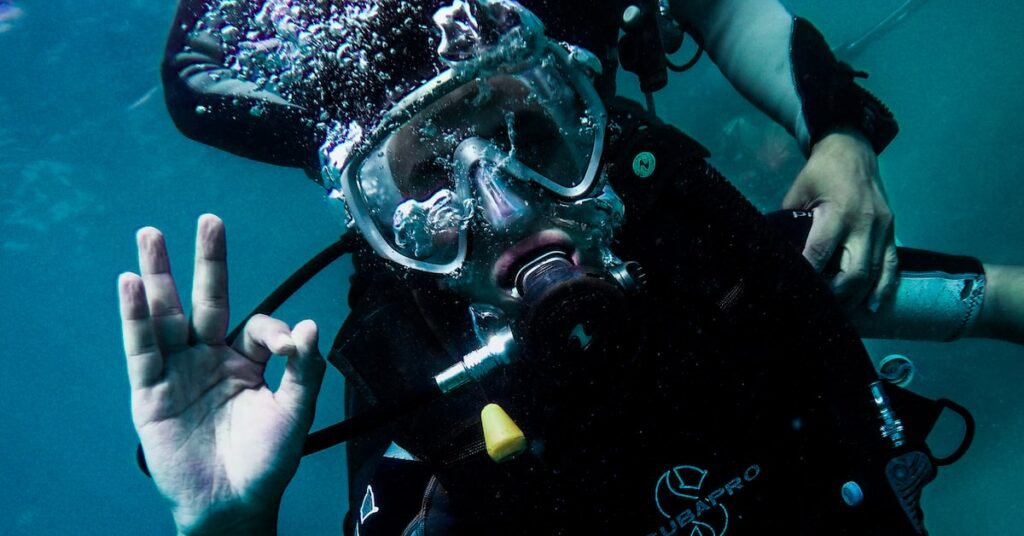

The effects of scuba diving on the brain outside of trauma are unknown. More studies and evidence is needed to make any solid claims of short- or long-term brain injuries related to normal diving activity.
In this article, we explain the issues in linking normal diving to brain damage and what long-term issues you should watch out for. We also discuss the normal side effects of scuba diving and which effects are cause for concern.
Can Scuba Diving Cause Brain Damage?
The evidence linking scuba diving to brain damage is inconclusive.
On one hand, you can expect many of the traumas of scuba diving to result in brain damage. Complications that limit or skew the supply of oxygen to the brain are likely to cause damage, including:
- Arterial gas embolisms
- Decompression sickness
- Contaminated air
- Toxicity (nitrogen or oxygen)
Loss of consciousness underwater is likely to lead to drowning, and even if you are revived you must deal with the secondary effects. The chance for trauma to the head while diving, regardless of what you run into, can cause brain damage.
The commonly disputed area is whether scuba diving causes brain damage or a prevalence to it without any of these issues. There are a few studies that link diving to cognitive issues such as decreased short-term memory or visual motor performance, but most scientists and divers argue that these studies are few and far between.
They also have issues establishing contingency for their claims, such as:
- Number of dives
- Depth of dives
- Other health factors
While the more obvious causes of scuba diving related brain damage are undisputed, these long-term claims have yet to stick, especially with the majority of divers having no signs or symptoms of long term effects.
Can You Lose Brain Cells from Scuba Diving?
You lose brain cells on a daily basis, but certain diving accidents can cause you to lose more than normal. These include:
- Head trauma, such as a concussion or taking a blow to the head
- Cerebral hypoxia that deprives your neurons of oxygen
- Arterial gas embolisms
- Stroke
- Pollution exposure
- Free radicals (or oxygen toxicity)
- Increased stress
Keep in mind that losing brain cells is actually a normal part of life. You don’t want to lose too many at one time, but your brain is actually able to repair itself through a process called neurogenesis.
Is Scuba Diving Bad for You Long-Term?
The long-term effects of scuba diving are overall disputed. There is little evidence to support any claims, any appearance of potential issues lacks a link to insinuate scuba diving as the cause.
We’re well aware of immediate injuries and illnesses that have the potential to evolve into something that is bad in the long term, such as decompression sickness or a collapsed lung.
If you scuba dive while suffering certain medical conditions, such as heart failure, the longer you dive the more you increase your chances of worsening your condition. In certain cases, this happens while you’re diving and can result in death.
Some studies indicate a correlation between scuba diving and issues such as:
- Osteonecrosis
- Loss of hearing
- Chronic long-term detriment to the brain, spinal cord, inner ear, retina, or small airways of the lung
- Decreased pulmonary or cognitive function
Keep in mind that correlation does not indicate causation. More evidence is needed to explicitly link long-term scuba diving to any of these detrimental effects.
Long Term Deep Diving
There is sufficient evidence to indicate that long-term deep diving links to issues such as:
- Decreased pulmonary function
- Airway narrowing
- Dysbaric osteonecrosis
- Certain neurological effects
The severity and the point at which they manifest appear established in these studies.
Is Scuba Diving Good for You Long-Term?
It’s easy to find long-term benefits of scuba diving, but they come with the same disclaimer. Many of the regularly accepted benefits are simply correlated to scuba diving and the normal lifestyle of divers, but they aren’t actually caused by long-term diving itself.
Still, you can expect advantages such as:
- Improved emotional wellbeing and mental health
- Improved blood circulation
- Reduction in blood pressure (barring a pre existing condition)
- Strength and flexibility in certain muscles
- Loss of weight and gaining of lean muscle
Many of the benefits of scuba diving are social, and many rely on the diver to make other advancements in their life.
What Are the Side Effects of Scuba Diving?
The side effects of scuba diving are nothing out of the ordinary. Expect a normal dive with no worries to have side effects such as:
- Fatigue or exhaustion (in proportion to your level of activity)
- Mild tenderness of your lungs (especially if you’re new to breathing underwater)
- Minor nosebleeds
- Reverse squeeze
- Soreness in the muscles you worked.
More severe side effects require medical attention. These include neurological troubles, chest pain or trouble breathing, and compromising pain that limits your movement and has no relief. Symptoms that are suspect alongside other issues include headaches, skin mottling, and tingling.
As a general rule, any side effects of diving that appear unusual, new, or intense should be evaluated by a medical professional.
References
https://thedivelab.dan.org/2017/01/12/does-diving-damage-the-brain/
https://dan.org/alert-diver/article/effects-of-diving-on-the-brain/
https://www.scuba.com/blog/scuba-guides/long-term-effects-scuba-diving/
https://mentalhealthdaily.com/2014/03/01/list-of-things-that-kill-brain-cells-the-death-of-neurons/
https://www.scubadiving.com/symptoms-you-should-never-ignore#page-3
